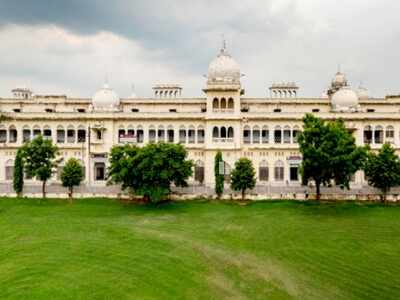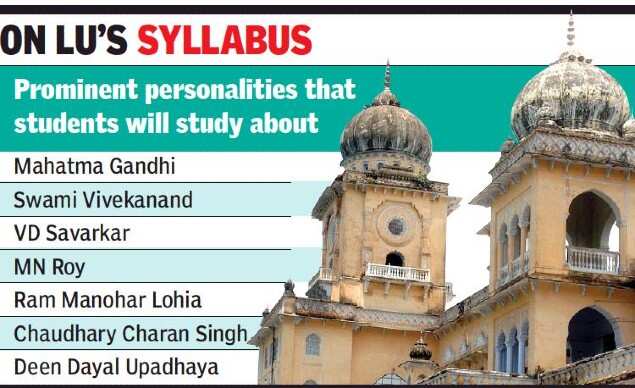- News
- City News
- lucknow News
- Lucknow University’s undergraduate courses to cover Mahatma Gandhi, VD Savarkar, Ram Manohar Lohia
Lucknow University’s undergraduate courses to cover Mahatma Gandhi, VD Savarkar, Ram Manohar Lohia

According to LU teachers, these inclusions have been done in the syllabus of the four-year UG course designed in accordance with New Education Policy (NEP) 2020. (File Photo)
LUCKNOW: Undergraduate (UG) students of political science and economics in Lucknow University (LU) and associated colleges will now study about Indian political and economic theorists from the right to left of the spectrum – from Mahatma Gandhi, Swami Vivekanand and VD Savarkar to MN Roy, Ram Manohar Lohia and Chaudhary Charan Singh.
In political science, for the first time two leading right-wing figures - father of Hindutva ideology and Hindu Mahasabha leader VD Savarkar and Deen Dayal Upadhaya, founder member of Bharatiya Jan Sangh (BJS) who propounded the theory of Integral humanism, will be included in the new paper on “Indian Political Thinkers”.

In the same paper, the syllabus will now also include elaborate study of life and work of Swami Vivekananda and MN Roy, whose philosophies till now were only touched at UG level.
Vivekananda established Hinduism in major world religions and introduced the west with the Indian philosophies of Vedanta and Yoga, besides contributing to the concept of Indian nationalism and Hindu reform movements. On the other hand, Roy was an international leftist revolutionary and founder member of Communist Party of India and Mexican Communist Party.
Similarly, for the first time, the UG syllabus of economics will include philosophies of Ram Manohar Lohia, Chaudhary Charan Singh and Deen Dayal Upadhaya.
Lohia was a leading Gandhian, socialist and politician, also credited as an “original thinker” in developing socialism philosophy in the Indian context. His contribution in politics, sociology and economics will be taught.
Singh was also a Gandhian and champion of farmers’ rights. He also served as chief minister of UP and fifth prime minister of India. His economic ideas and critique of the development discourse in India from agrarian and rural perspective will be the part of the paper.
The economic nuances in the integral humanism theory of Upadhyaya, who is also an RSS icon and one of the architects of BJS, the predecessor party of the now ruling BJP, will be taught.
And, last but not the least, there will be a detailed study of economic concepts propounded by the father of nation, Mahatma Gandhi, such as trusteeship principle, self-sufficient village units and an economic order based on simplicity, decentralization, cooperation, equality, non-violence and human values.
There will not be a separate paper on these leaders in economics, but chapters on different issues will include their teachings.
According to LU teachers, these inclusions have been done in the syllabus of the four-year UG course designed in accordance with New Education Policy (NEP) 2020. The proposals have been approved by the board of studies of political science and economics. Now, they will be tabled before Board of Arts Faculty and then LU’s academic Council for final approval.
“It is essential for students to understand their country first through the mind of our `economic icons’. Foreign policies won’t work in the Indian context as our culture, challenges and practices are different. Our thinkers said the fruits of development should reach the last man,” said head of the economics department Prof MK Agarwal.
When contacted, head of political science, Prof Manuka Khanna, “Students will learn Indian political theorists and how Indian political thought has impacted the western political thoughts.”
In political science, for the first time two leading right-wing figures - father of Hindutva ideology and Hindu Mahasabha leader VD Savarkar and Deen Dayal Upadhaya, founder member of Bharatiya Jan Sangh (BJS) who propounded the theory of Integral humanism, will be included in the new paper on “Indian Political Thinkers”.

In the same paper, the syllabus will now also include elaborate study of life and work of Swami Vivekananda and MN Roy, whose philosophies till now were only touched at UG level.
Vivekananda established Hinduism in major world religions and introduced the west with the Indian philosophies of Vedanta and Yoga, besides contributing to the concept of Indian nationalism and Hindu reform movements. On the other hand, Roy was an international leftist revolutionary and founder member of Communist Party of India and Mexican Communist Party.
Similarly, for the first time, the UG syllabus of economics will include philosophies of Ram Manohar Lohia, Chaudhary Charan Singh and Deen Dayal Upadhaya.
Lohia was a leading Gandhian, socialist and politician, also credited as an “original thinker” in developing socialism philosophy in the Indian context. His contribution in politics, sociology and economics will be taught.
Singh was also a Gandhian and champion of farmers’ rights. He also served as chief minister of UP and fifth prime minister of India. His economic ideas and critique of the development discourse in India from agrarian and rural perspective will be the part of the paper.
The economic nuances in the integral humanism theory of Upadhyaya, who is also an RSS icon and one of the architects of BJS, the predecessor party of the now ruling BJP, will be taught.
And, last but not the least, there will be a detailed study of economic concepts propounded by the father of nation, Mahatma Gandhi, such as trusteeship principle, self-sufficient village units and an economic order based on simplicity, decentralization, cooperation, equality, non-violence and human values.
There will not be a separate paper on these leaders in economics, but chapters on different issues will include their teachings.
According to LU teachers, these inclusions have been done in the syllabus of the four-year UG course designed in accordance with New Education Policy (NEP) 2020. The proposals have been approved by the board of studies of political science and economics. Now, they will be tabled before Board of Arts Faculty and then LU’s academic Council for final approval.
“It is essential for students to understand their country first through the mind of our `economic icons’. Foreign policies won’t work in the Indian context as our culture, challenges and practices are different. Our thinkers said the fruits of development should reach the last man,” said head of the economics department Prof MK Agarwal.
When contacted, head of political science, Prof Manuka Khanna, “Students will learn Indian political theorists and how Indian political thought has impacted the western political thoughts.”
FacebookTwitterLinkedinEMail
Start a Conversation
end of article
Quick Links
Delhi Air PollutionDelhi TemperatureChennai WeatherBangalore TemperatureCovid vaccination centres in DelhiCoronavirus in DelhiRTPCR test in GurgaonHyderabad RainPollution level in BangaloreDelhi SmogDelhi TemperatureNoida AQIGurgaon AQI todayFire in MumbaiMumbai RainsCovid 19 RT PCR Test in NoidaDelhi AQI todaySrinagar encounter
